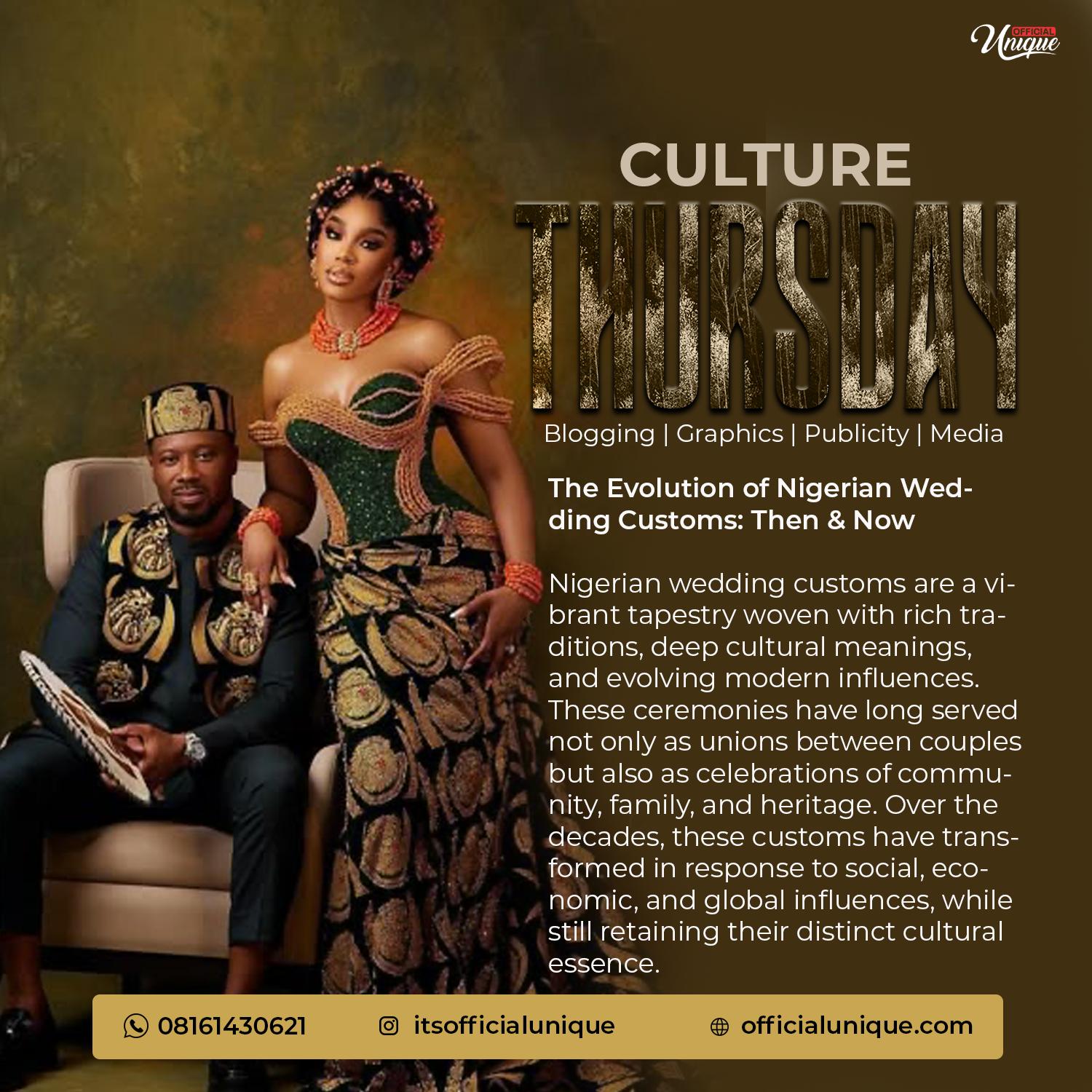Culture Focus: The Evolution of Nigerian Wedding Customs: Then & Now
Nigerian wedding customs are a vibrant tapestry woven with rich traditions, deep cultural meanings, and evolving modern influences. These ceremonies have long served not only as unions between couples but also as celebrations of community, family, and heritage. Over the decades, these customs have transformed in response to social, economic, and global influences, while still retaining their distinct cultural essence. Today, the evolution of Nigerian wedding customs reflects both the enduring values of the past and the dynamic spirit of the modern era.
Historically, Nigerian weddings were elaborate communal affairs. In many ethnic groups, from the Yoruba to the Igbo and Hausa, weddings were deeply rooted in ritual, symbolism, and tradition. In the Yoruba tradition, for example, a traditional engagement—known as the “introduction” or “knocking” ceremony—served as a formal meeting of the families. These ceremonies featured symbolic gifts, such as kola nuts, which represented hospitality and unity, and rituals that underscored the sanctity of marriage. Traditional attire, music, and dance played a central role; vibrant Aso Oke fabrics, intricate beadwork, and regal head-ties were worn to honor ancestral customs.
In contrast, the Igbo weddings were marked by rites that symbolized the transition from childhood to adulthood. Rituals such as the bride price and symbolic gestures like the “Iku aka” (hand-kissing) and “Igba nkwu” (wine carrying) celebrated the joining of two families. These practices were steeped in meaning—each act was a narrative of respect, commitment, and the promise of mutual support.
Over time, economic changes and globalization began to influence these traditions. Urbanization and increased exposure to Western lifestyles introduced new elements into Nigerian weddings. Couples increasingly opted for blended ceremonies that combined traditional customs with modern influences. For instance, while the traditional introduction and dowry negotiations remain central in many communities, they are now often followed by a church or civil wedding ceremony. This dual format honors ancestral customs while aligning with contemporary legal and religious frameworks.
Modern Nigerian weddings now reflect the aspirations and lifestyles of today’s youth. Many couples embrace a fusion of cultures: traditional ceremonies are given a modern twist with choreographed dances, contemporary music, and innovative décor. Modern technology has also made its mark—social media and live streaming allow families and friends from around the globe to witness the celebrations in real time, broadening the reach of these cultural events beyond local communities.
The evolution is not just limited to the ceremonies themselves but extends to the symbolism and the roles within the weddings.
Traditionally, the bride and groom were expected to follow rigid gender roles and rituals. Today, there is a noticeable shift towards gender equality and personalization. Couples now make decisions together about which traditions to uphold and which to modify or even discard, creating a wedding that is uniquely their own. This collaborative approach is reflective of broader societal changes where individual expression and mutual respect are highly valued.
The influence of the media and celebrity culture has also played a significant role in reshaping Nigerian wedding customs. High-profile weddings of celebrities are now widely publicized, setting trends that many aspire to replicate. These events often feature extravagant productions, designer outfits, and elaborate entertainment, which in turn inspire ordinary couples to dream big and incorporate elements of glamour into their own ceremonies. Yet, amidst this extravagance, there remains a persistent desire to honor cultural heritage—many couples carefully blend modern luxury with time-honored traditions, ensuring that the soul of their heritage is not lost.
Economic factors have also impacted wedding customs. While the lavish spending on ceremonies was once seen as a mark of prosperity and social status, there is now a growing awareness of practicality and sustainability. Many couples opt for more intimate gatherings or choose to invest in experiences and long-term assets rather than extravagant one-day events. This pragmatic shift is prompting a re-evaluation of what it means to celebrate love and commitment in a rapidly changing world.
Despite these changes, the core values of Nigerian weddings endure. At their heart, these ceremonies continue to be about community, love, and the coming together of families. The rituals—whether as simple as the exchange of symbolic gifts or as elaborate as multi-day
celebrations—serve as a reminder of the importance of connection and continuity. They are a testament to a culture that values not only individual happiness but also collective joy and shared identity.
For many, these weddings are more than just celebrations; they are a reaffirmation of identity in the face of globalization. They encapsulate the beauty of cultural evolution—honoring the past while embracing the future. Whether it’s the nostalgic charm of age-old rituals or the innovative spirit of modern celebrations, Nigerian wedding customs continue to resonate deeply with people from all walks of life.
In essence, the evolution of Nigerian wedding customs tells a broader story of adaptation and resilience. As society continues to evolve, so too do its traditions—keeping them relevant, dynamic, and reflective of the times. For anyone who has experienced the magic of a Nigerian wedding, the blend of history, culture, and modernity is a source of inspiration—a living, breathing celebration of life’s most cherished moments.
For Advertisements, Song Uploads, Interview, Biography, Music Promotions and Article Publication please Call or Whatsapp 08161430621.
Want to Get Featured?
– Showcase your event!
– Highlight your venue!
– Get your music video featured!
– Promote your brand with an advert!
– Be our Picture Pick of the Week!
– Make your song the Song of the Week!
Call or WhatsApp: 08161430621.
